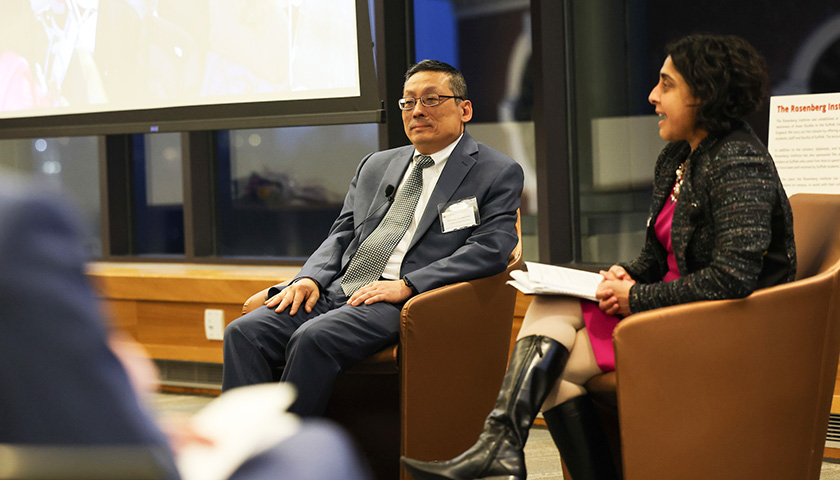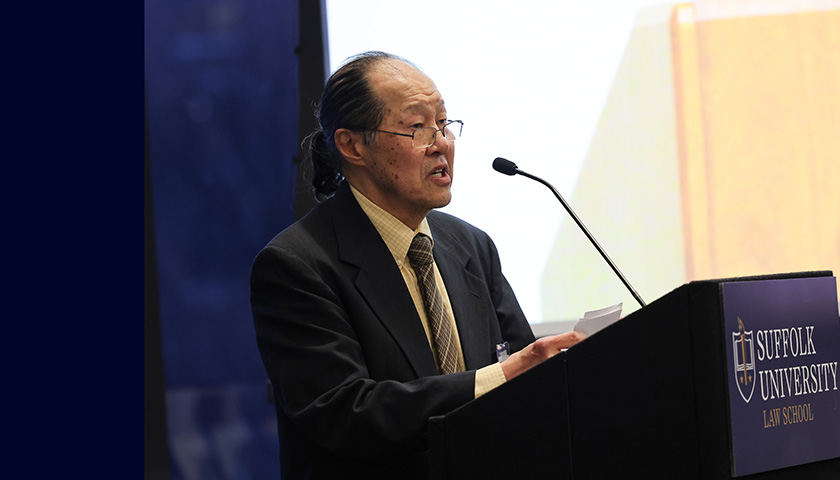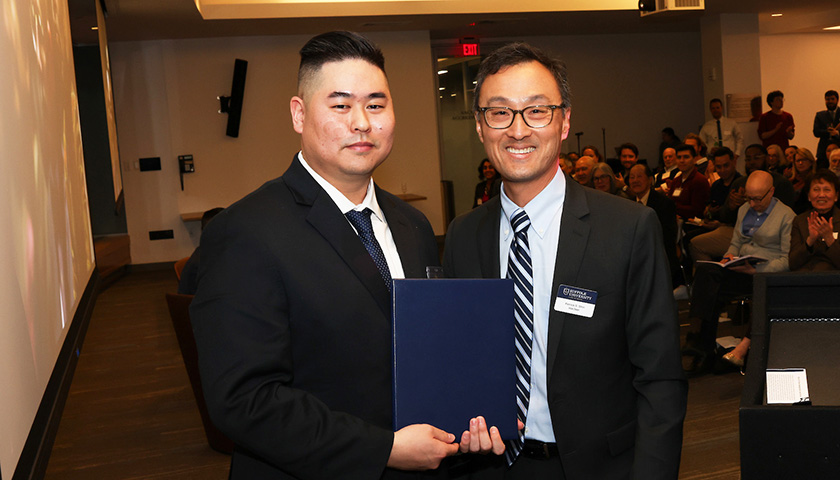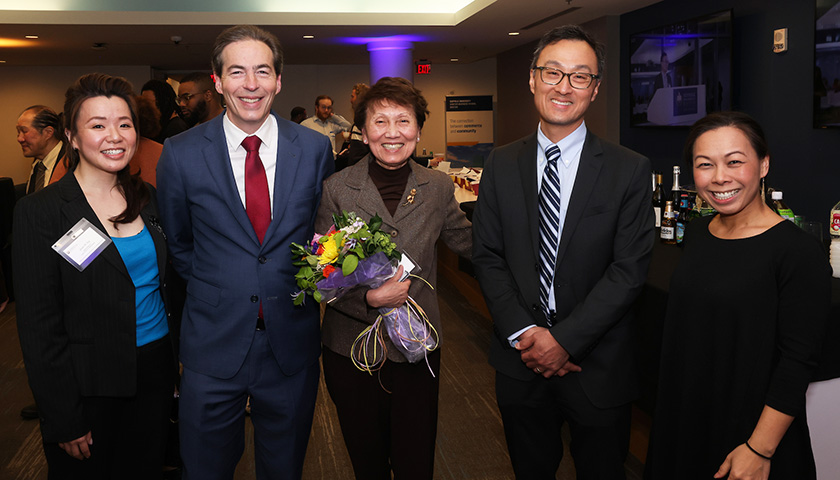Each is a trailblazer: Dow was the first Asian American to be admitted to the Massachusetts Bar, and Joun is the first Asian American man to serve on the federal bench in Massachusetts. And both have made advocating for the underserved a cornerstone of their careers.
That made Joun a particularly fitting keynote speaker for this year’s annual Harry Dow Lecture Series on Immigration Law, held April 3 at Sargent Hall before a large and appreciative audience.

Joun attended the Law School’s evening program from 1995 to 1999, working during the day during his 1L year as a regional manager for a dollar store chain, and later as a paralegal/office manager for a solo practitioner.
Professor Shah set out for the audience a few of the cases the judge had led as a civil rights attorney before taking the bench at the BMC, including his successful representation of seven restaurant workers whose employer did not pay them overtime wages.
Joun said the wages case meant a great deal to him “because of the working conditions and pay that I knew from my own family. My mother worked for a garment factory for many, many years. And there were no benefits. There were no holidays. If a needle went through her fingernails, she didn't get any sick time. And she only got paid for every piece that she produced.”
The clothes on their backs
Asked about his early memories moving to the U.S. from South Korea during his elementary school years, Joun said he couldn’t remember much, but he did recall that the family arrived in New York without any luggage. His mother had sold all of their belongings. “We just wore layers of whatever clothes we had. And so I remember just the door [of the plane] opening and feeling the heat,” he said.
“In the mid-70s, especially in the neighborhood that we ended up settling in, there weren’t any Asian families around. So, I think it was difficult not knowing the language, not being able to communicate with people. But I do have a memory of a sweet classmate who grabbed my hand to show me where the art class was, and where I could get supplies, and I didn’t know that there was snack-time in class. So, I didn’t have any snacks. And I remember her sharing her celery with me.”
Joun said he started taking an interest in the law in middle school. A friend told him that there was a local attorney who came to the school every two weeks to talk about the law. Joun said that at first he saw the class just as an opportunity to get some juice and cookies. The lawyer introduced the students to Miranda v. Arizona, a 1966 Supreme Court case that established the legal principle of the right to remain silent.
“And you know, I was 12, I think, and the neighborhood that I was growing up, it’s highly policed, there were issues even at that age… Just listening to this [attorney] talk about this case, it was shocking to me to learn that we all have rights, including me. That someone who didn’t think he had any sort of power or leverage—that we all had this right. So it grabbed my attention.”
He continued to attend the law club, learning next about Gideon v. Wainwright, which laid out the requirement for states to provide attorneys to criminal defendants who can’t afford their own. “I fell in love with the law,” he said.
During law school, Joun served in Professor Emeritus Steve Callahan’s Chelsea-based landlord-tenant clinic. “That work meant a lot to me,” he said, providing him with practical experience in preparing for court and making legal arguments, but also in building rapport with clients facing a traumatic experience. “I still get emotional, sometimes, talking about it, because, growing up we lost housing.”
Asked whether he had advice for law students interested in becoming a judge someday, Joun said he wasn’t sure he was the right person to ask, because he hadn’t taken a traditional path. “Lawyering isn’t easy. Sometimes you work all hours, all day, all night. But if you believe in the work, it’ll sustain you,” he said. “Money’s important, too. But if that’s what’s moving you, I suspect it’s not going to sustain you in the long run.”

Carrying on his father’s legacy
Harry Hom Dow’s son, Frederick Dow, opened the evening by invoking his father’s impact on Boston and beyond. “In the face of adversity, he chose to serve the underserved, the underrepresented, the marginalized, and the poor,” said Dow, a former senior investigator of the U.S. Department of Education Office of Civil Rights.
Harry Hom Dow’s name is among a group of civil rights leaders memorialized on plaques at Boston’s Freedom Plaza, home of the Martin Luther King, Jr./Coretta Scott King Embrace statue, which has become “a touchstone for many Asian Americans in our community,” his son said.
As he did at the inaugural Dow Lecture ten years ago, Frederick Dow quoted Nelson Mandela, who declared that “overcoming poverty is not a gesture of charity,” and that “like slavery and apartheid, poverty is not natural. It is man-made, and it can be overcome and eradicated by the actions of human beings.”
Harry Dow was admitted to Suffolk Law in 1925 by the school’s founder Gleason Archer. Twenty-one years after he was admitted to the Massachusetts Bar, census data still listed only 15 Asian attorneys in the entire Northeast, Dow among them. Racism dogged Dow’s legal career, including false accusations of collusion made against him during Senator Joe McCarthy’s Red Scare. In spite of those hurdles, Dow achieved many victories on behalf of immigrants, the elderly, and people getting by on subsistence wages.

A scholarship recipient with a public-service focus
Suffolk Law Vice Dean Patrick Shin, who introduced Harry Dow Scholarship Award recipient Seung Won Frank Lee, mentioned his own pride in the solidarity he has seen across the Law School, among faculty, alumni, students and staff, in their “shared desire to help ensure that the law school continues to play a part in producing lawyers like Harry Dow and Judge Joun.”Lee, a South Korean immigrant, serves on the board of the Law School’s Asian Pacific American Law Students Association. Before attending Suffolk, he served as an AmeriCorps member working with Vietnamese and Hispanic middle-school students in a low-income area of Silicon Valley. During his 1L summer he interned with Greater Boston Legal Services’ tax clinic providing pro bono assistance. After graduation, he plans to become even more involved in serving the immigrant community.

Jessie W. Yip, JD ’15; Dean Andrew Perlman; Justina Chu; Vice Dean Patrick Shin; Vatsady Sivongxay, JD ‘11
118 years later, the same mission
At the event’s conclusion, Dean Andrew Perlman connected the Dow Scholarship’s aid for service-minded students with Suffolk Law’s mission. Archer founded Suffolk Law in 1906 “to serve immigrants and the children of immigrants in Boston, people who were otherwise prevented from attending law school elsewhere, because of who they were or where they were from,” he said. That mission, lives on, he noted, with 20% of Suffolk’s incoming class comprised of first-generation students, and with scholarship programs like the Dow Fund.
Perlman offered a special thanks to Justina Chu, the founder of the Dow Scholarship and an inspiration for the lecture and awards ceremony. “She’s incredibly special and we all would not be here this evening without her,” he said.
Dow Lecture Series sponsorships
- Suffolk Law Asian Pacific American Law Students Association (APALSA)
- Asian American Lawyers Association of Massachusetts (AALAM)
- Rosenberg Institute for East Asian Studies at Suffolk University
Special thanks to the Dow Family.



